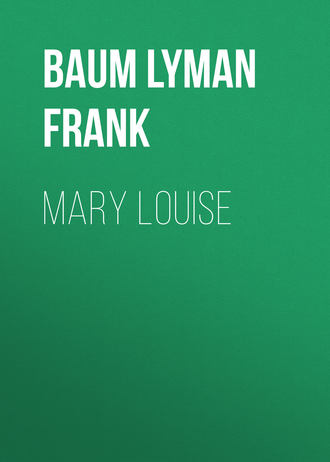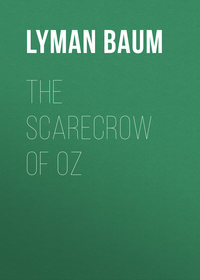 полная версия
полная версияMary Louise
Cooper's Hotel, a modest and not very inviting frame building, stood near the center of the village and as Mary Louise and her grandfather passed it the door opened and a man stepped out and only avoided bumping into them by coming to a full stop. They stopped also, of necessity, and Mary Louise was astonished to find the stranger staring into the Colonel's face with an expression of mingled amazement and incredulity on his own.
"James Hathaway, by all the gods!" he exclaimed, adding in wondering tones: "And after all these years!"
Mary Louise, clinging to her grandfather's arm, cast an upward glance at his face. It was tensely drawn; the eyelids were half closed and through their slits the Colonel's eyes glinted fiercely.
"You are mistaken, fellow. Out of my way!" he said, and seizing the girl's arm, which she had withdrawn in affright, he marched straight ahead. The man fell back, but stared after them with his former expression of bewildered surprise. Mary Louise noted this in a glance over her shoulder and something in the stranger's attitude – was it a half veiled threat? – caused her to shudder involuntarily.
The Colonel strode on, looking neither to right nor left, saying never a word. They reached their home grounds, passed up the path in silence and entered the house. The Colonel went straight to the stairs and cried in a loud voice:
"Beatrice!"
The tone thrilled Mary Louise with a premonition of evil. A door was hastily opened and her mother appeared at the head of the stairs, looking down on them with the customary anxiety on her worn features doubly accentuated.
"Again, father?" she asked in a voice that slightly trembled.
"Yes. Come with me to the library, Beatrice."
CHAPTER IV
SHIFTING SANDS
Mary Louise hid herself in the drawing-room, where she could watch the closed door of the library opposite. At times she trembled with an unknown dread; again, she told herself that no harm could possibly befall her dear, good Gran'pa Jim or her faithful, loving mother. Yet why were they closeted in the library so long, and how could the meeting with that insolent stranger affect Colonel Weatherby so strongly?
After a long time her mother came out, looking more pallid and harassed than ever but strangely composed. She kissed Mary Louise, who came to meet her, and said:
"Get ready for dinner, dear. We are late."
The girl went to her room, dazed and uneasy. At dinner her mother appeared at the table, eating little or nothing, but Gran'pa Jim was not present. Afterward she learned that he had gone over to Miss Stearne's School for Girls, where he completed important arrangements concerning his granddaughter.
When dinner was over Mary Louise went into the library and, drawing a chair to where the light of the student lamp flooded her book, tried to read. But the words were blurred and her mind was in a sort of chaos. Mamma Bee had summoned Aunt Polly and Uncle Eben to her room, where she was now holding a conference with the faithful colored servants. A strange and subtle atmosphere of unrest pervaded the house; Mary Louise scented radical changes in their heretofore pleasant home life, but what these changes were to be or what necessitated them she could not imagine.
After a while she heard Gran'pa Jim enter the hall and hang up his hat and coat and place his cane in the rack. Then he came to the door of the library and stood a moment looking hard at Mary Louise. Her own eyes regarded her grandfather earnestly, questioning him as positively as if she had spoken.
He drew a chair before her and leaning over took both her hands in his and held them fast.
"My dear," he said gently, "I regret to say that another change has overtaken us. Have you ever heard of 'harlequin fate'? 'Tis a very buffoon of mischief and irony that is often permitted to dog our earthly footsteps and prevent us from becoming too content with our lot. For a time you and I, little maid, good comrades though we have been, must tread different paths. Your mother and I are going away, presently, and we shall leave you here in Beverly, where you may continue your studies under the supervision of Miss Stearne, as a boarder at her school. This house, although the rental is paid for six weeks longer, we shall at once vacate, leaving Uncle Eben and Aunt Sallie to put it in shape and close it properly. Do you understand all this, Mary Louise?"
"I understand what you have told me, Gran'pa Jim. But why – "
"Miss Stearne will be supplied with ample funds to cover your tuition and to purchase any supplies you may need. You will have nothing to worry about and so may devote all your energies to your studies."
"But how long – "
"Trust me and your mother to watch over your welfare, for you are very dear to us, believe me," he continued, disregarding her interruptions. "Do you remember the address of the Conants, at Dorfield?"
"Of course."
"Well, you may write to me, or to your mother, once a week, addressing the letter in care of Peter Conant. But if you are questioned by anyone," he added, gravely, "do not mention the address of the Conants or hint that I have gone to Dorfield. Write your letters privately and unobserved, in your own room, and post them secretly, by your own hand, so that no one will be aware of the correspondence. Your caution in this regard will be of great service to your mother and me. Do you think you can follow these instructions?"
"To be sure I can, Gran'pa Jim. But why must I – "
"Some day," said he, "you will understand this seeming mystery and be able to smile at your present perplexities. There is nothing to fear, my dear child, and nothing that need cause you undue anxiety. Keep a brave heart and, whatever happens, have faith in Gran'pa Jim. Your mother – as good a woman as God ever made – believes in me, and she knows all. Can you accept her judgment, Mary Louise? Can you steadfastly ignore any aspersions that may be cast upon my good name?"
"Yes, Gran'pa Jim."
She had not the faintest idea what he referred to. Not until afterward was she able to piece these strange remarks together and make sense of them. Just now the girl was most impressed by the fact that her mother and grandfather were going away and would leave her as a boarder with Miss Stearne. The delightful home life, wherein she had passed the happiest two years of her existence, was to be broken up for good and all.
"Now I must go to your mother. Kiss me, my dear!"
As he rose to his feet Mary Louise also sprang from her chair and the Colonel folded his arms around her and for a moment held her tight in his embrace. Then he slowly released her, holding the girl at arms' length while he studied her troubled face with grave intensity. One kiss upon her upturned forehead and the old man swung around and left the room without another word.
Mary Louise sank into her chair, a little sob in her throat. She felt very miserable, indeed, at that moment. "Harlequin fate!" she sighed. "I wonder why it has chosen us for its victims?"
After an hour passed in the deserted library she stole away to her own room and prepared for bed. In the night, during her fitful periods of sleep, she dreamed that her mother bent over her and kissed her lips – once, twice, a third time.
The girl woke with a start. A dim light flooded her chamber, for outside was a full moon. But the room was habited only by shadows, save for her own feverish, restless body. She turned over to find a cooler place and presently fell asleep again.
CHAPTER V
OFFICIAL INVESTIGATION
"And you say they are gone?" cried Mary Louise in surprise, as she came down to breakfast the next morning and found the table laid for one and old Eben waiting to serve her.
"In de night, chile. I don' know 'zac'ly wha' der time, by de clock, but de Kun'l an' Missy Burrows did'n' sleep heah a-tall."
"There is no night train," said the girl, seating herself thoughtfully at the table. "How could they go, Uncle?"
"Jus' took deh auto'bile, chile, an' de Kun'l done druv it heself – bag an' baggage. But – see heah, Ma'y 'Ouise – we-all ain' s'pose to know nuth'n' bout dat git-away. Ef some imper'nent puss'n' ask us, we ain' gwine t' know how dey go, nohow. De Kun'l say tell Ma'y 'Ouise she ain' gwine know noth'n' a-tall, 'bout nuth'n', 'cause 'tain't nobody's business."
"I understand, Uncle Eben."
She reflected upon this seemingly unnecessary secrecy as she ate her breakfast. After a time she asked:
"What are you and Aunt Polly going to do, Uncle?"
"Fus' thing," replied the old negro, "Polly gwine git yo' traps all pack up an' I gwine take 'em ovah to Missy Stearne's place in de wheel-barrer. Den I gwine red up de house an' take de keys to Mass' Gimble, de agent. Den Polly an' me we go back to our own li'l' house in de lane yondeh. De Kun'l done 'range ev'thing propeh, an' we gwine do jus' like he say."
Mary Louise felt lonely and uncomfortable in the big house, now that her mother and grandfather had gone away. Since the move was inevitable, she would be glad to go to Miss Stearne as soon as possible. She helped Aunt Polly pack her trunk and suit case, afterwards gathering into a bundle the things she had forgotten or overlooked, all of which personal belongings Uncle Eben wheeled over to the school. Then she bade the faithful servitors good-bye, promising to call upon them at their humble home, and walked slowly over the well-known path to Miss Stearne's establishment, where she presented herself to the principal.
It being Saturday, Miss Stearne was seated at a desk in her own private room, where she received Mary Louise and bade her sit down.
Miss Stearne was a woman fifty years of age, tall and lean, with a deeply lined face and a tendency to nervousness that was increasing with her years. She was a very clever teacher and a very incompetent business woman, so that her small school, of excellent standing and repute, proved difficult to finance. In character Miss Stearne was temperamental enough to have been a genius. She was kindly natured, fond of young girls and cared for her pupils with motherly instincts seldom possessed by those in similar positions. She was lax in many respects, severely strict in others. Not always were her rules and regulations dictated by good judgment. Therefore her girls usually found as much fault as other boarding school girls are prone to do, and with somewhat more reason. On the other hand, no one could question the principal's erudition or her skill in imparting her knowledge to others.
"Sit down, Mary Louise," she said to the girl. "This is an astonishing change in your life, is it not? Colonel Weatherby came to me last evening and said he had been suddenly called away on important matters that would brook no delay, and that your mother was to accompany him on the journey. He begged me to take you in as a regular boarder and of course I consented. You have been one of my most tractable and conscientious pupils and I have been proud of your progress. But the school is quite full, as you know; so at first I was uncertain that I could accommodate you here; but Miss Dandler, my assistant, has given up her room to you and I shall put a bed for her in my own sleeping chamber, so that difficulty is now happily arranged. I suppose your family left Beverly this morning, by the early train?"
"They have gone," replied Mary Louise, non-committally.
"You will be lonely for a time, of course, but presently you will feel quite at home in the school because you know all of my girls so well. It is not like a strange girl coming into a new school. And remember, Mary Louise, that you are to come to me for any advice and assistance you need, for I promised your grandfather that I would fill your mother's place as far as I am able to do so."
Mary Louise reflected, with a little shock of pain, that her mother had never been very near to her and that Miss Stearne might well perform such perfunctory duties as the girl had been accustomed to expect. But no one could ever take the place of Gran'pa Jim.
"Thank you, Miss Stearne," she said. "I am sure I shall be quite contented here. Is my room ready?"
"Yes; and your trunk has already been placed in it. Let me know, my dear, if there is anything you need."
Mary Louise went to her room and was promptly pounced upon by Dorothy Knerr and Sue Finley, who roomed just across the hall from her and were delighted to find she was to become a regular boarder. They asked numerous questions as they helped her to unpack and settle her room, but accepted her conservative answers without comment.
At the noon luncheon Mary Louise was accorded a warm reception by the assembled boarders and this cordial welcome by her school-mates did much to restore the girl to her normal condition of cheerfulness. She even joined a group in a game of tennis after luncheon and it was while she was playing that little Miss Dandler came with, a message that Mary Louise was wanted in Miss Stearne's room at once.
"Take my racquet," she said to Jennie Allen; "I'll be back in a minute."
When she entered Miss Stearne's room she was surprised to find herself confronted by the same man whom she and her grandfather had encountered in front of Cooper's Hotel the previous afternoon – the man whom she secretly held responsible for this abrupt change in her life. The principal sat crouched over her desk as if overawed by her visitor, who stopped his nervous pacing up and down the room as the girl appeared.
"This is Mary Louise Burrows," said Miss Stearne, in a weak voice.
"Huh!" He glared at her with a scowl for a moment and then demanded:
"Where's Hathaway?"
Mary Louise reddened.
"I do not know to whom you refer," she answered quietly.
"Aren't you his granddaughter?"
"I am the granddaughter of Colonel James Weatherby, sir."
"It's all the same; Hathaway or Weatherby, the scoundrel can't disguise his personality. Where is he?"
She did not reply. Her eyes had narrowed a little, as the Colonel's were sometimes prone to do, and her lips were pressed firmly together.
"Answer me!" he shouted, waving his arms threateningly.
"Miss Stearne," Mary Louise said, turning to the principal, "unless you request your guest to be more respectful I shall leave the room."
"Not yet you won't," said the man in a less boisterous tone. "Don't annoy me with your airs, for I'm in a hurry. Where is Hathaway – or Weatherby – or whatever he calls himself?"
"I do not know."
"You don't, eh? Didn't he leave an address?"
"No."
"I don't believe you. Where did he go?"
"If I knew," said Mary Louise with dignity, "I would not inform you."
He uttered a growl and then threw back his coat, displaying a badge attached to his vest.
"I'm a federal officer," he asserted with egotistic pride, "a member of the Government's Secret Service Department. I've been searching for James J. Hathaway for nine years, and so has every man in the service. Last night I stumbled upon him by accident, and on inquiring found he has been living quietly in this little jumping-off place. I wired the Department for instructions and an hour ago received orders to arrest him, but found my bird had flown. He left you behind, though, and I'm wise to the fact that you're a clew that will lead me straight to him. You're going to do that very thing, and the sooner you make up your mind to it the better for all of us. No nonsense, girl! The Federal Government's not to be trifled with. Tell me where to find your grandfather."
"If you have finished your insolent remarks," she answered with spirit,
"I will go away. You have interrupted my game of tennis."
He gave a bark of anger that made her smile, but as she turned away he sprang forward and seized her arm, swinging her around so that she again faced him.
"Great Caesar, girl! Don't you realize what you're up against?" he demanded.
"I do," said she. "I seem to be in the power of a brute. If a law exists that permits you to insult a girl, there must also be a law to punish you. I shall see a lawyer and try to have you properly punished for this absolute insolence."
He regarded her keenly, still frowning, but when he spoke again he had moderated both his tone and words.
"I do not intend to be insolent, Miss Burrows, but I have been greatly aggravated by your grandfather's unfortunate escape and in this emergency every moment is precious if I am to capture him before he gets out of America, as he has done once or twice before. Also, having wired the Department that I have found Hathaway, I shall be discredited if I let him slip through my fingers, so I am in a desperate fix. If I have seemed a bit gruff and nervous, forgive me. It is your duty, as a loyal subject of the United States, to assist an officer of the law by every means in your power, especially when he is engaged in running down a criminal. Therefore, whether you dislike to or not, you must tell me where to find your grandfather."
"My grandfather is not a criminal, sir."
"The jury will decide that when his case comes to trial. At present he is accused of crime and a warrant is out for his arrest. Where is he?"
"I do not know," she persisted.
"He – he left by the morning train, which goes west," stammered Miss Stearne, anxious to placate the officer and fearful of the girl's stubborn resistance.
"So the nigger servant told me," sneered the man; "but he didn't. I was at the station myself – two miles from this forsaken place – to make sure that Hathaway didn't skip while I was waiting for orders. Therefore, he is either hidden somewhere in Beverly or he has sneaked away to an adjoining town. The old serpent is slippery as an eel; but I'm going to catch him, this time, as sure as fate, and this girl must give me all the information she can."
"Oh, that will be quite easy," retorted Mary Louise, somewhat triumphantly, "for I have no information to divulge."
He began to pace the room again, casting at her shrewd and uncertain glances.
"He didn't say where he was going?"
"No."
"Or leave any address?"
"No."
"What DID he say?"
"That he was going away and would arrange with Miss Stearne for me to board at the school."
"Huh! I see. Foxy old guy. Knew I would question you and wouldn't take chances. If he writes you, or you learn what has become of him, will you tell me?"
"No."
"I thought not." He turned toward the principal. "How about this girl's board money?" he asked. "When did he say he'd send it?"
"He paid me in advance, to the end of the present term," answered the agitated Miss Stearne.
"Foxy old boy! Seemed to think of everything. I'm going, now; but take this warning – both of you. Don't gabble about what I've said. Keep the secret. If nothing gets out, Hathaway may think the coast is clear and it's safe for him to come back. In that case I – or someone appointed by the Department – will get a chance to nab him. That's all. Good day."
He made his exit from the room without ceremony, leaving Mary Louise and Miss Stearne staring fearfully at one another.
"It – it's – dreadful!" stammered the teacher, shrinking back with a moan.
"It would be, if it were true," said the girl. "But Gran'pa Jim is no criminal, we all know. He's the best man that ever lived, and the whole trouble is that this foolish officer has mistaken him for someone else. I heard him, with my own ears, tell the man he was mistaken."
Miss Stearne reflected.
"Then why did your grandfather run away?" she asked.
It was now Mary Louise's turn to reflect, seeking an answer. Presently she realized that a logical explanation of her grandfather's action was impossible with her present knowledge.
"I cannot answer that question, Miss Stearne," she admitted, candidly, "but Gran'pa Jim must have had some good reason."
There was unbelief in the woman's eyes – unbelief and a horror of the whole disgraceful affair that somehow included Mary Louise in its scope. The girl read this look and it confused her. She mumbled an excuse and fled to her room to indulge in a good cry.
CHAPTER VI
UNDER A CLOUD
The officer's injunction not to talk of the case of Colonel Weatherby was of little avail in insuring secrecy. Oscar Dowd, who owned and edited the one weekly newspaper in town, which appeared under the title of "The Beverly Beacon," was a very ferret for news. He had to be; otherwise there never would have been enough happenings in the vicinity to fill the scant columns of his little paper, which was printed in big type to make the items and editorials fill as much space as possible.
Uncle Eben met the editor and told him the Colonel had gone away suddenly and had vacated the Vandeventer mansion and put Mary Louise with Miss Stearne to board. Thereat, Oscar Dowd scented "news" and called on Miss Stearne for further information. The good lady was almost as much afraid of an editor as of an officer of the law, so under Oscar's rapid-fire questioning she disclosed more of the dreadful charge against Colonel Weatherby than she intended to. She even admitted the visit of the secret service agent, but declined to give details of it.
Oscar found the agent had departed for parts unknown – perhaps to trail the escaped Colonel – but the hotel keeper furnished him with other wisps of information and, bunching all the rumors together and sifting the wheat from the chaff, the editor evolved a most thrilling tale to print in the Wednesday paper. Some of the material his own imagination supplied; much else was obtained from irresponsible gossips who had no foundation for their assertions. Miss Stearne was horrified to find, on receiving her copy of the Wednesday "Beacon" that big headlines across the front page announced: "Beverly Harbors a Criminal in Disguise! Flight of Colonel James Weatherby when a Federal Officer Seeks to Arrest him for a Terrible Crime!"
Then followed a mangled report of the officer's visit to Beverly on government business, his recognition of Colonel Weatherby – who was none other than the noted criminal, James J. Hathaway – on the street in front of Cooper's Hotel, how the officer wired Washington for instructions and how Hathaway, alias Weatherby, escaped in the dead of night and had so far successfully eluded all pursuit. What crime Hathaway, alias Weatherby, was accused of, the officer would not divulge, and the statements of others disagreed. One report declared the Colonel had wrecked a New York bank and absconded with enormous sums he had embezzled; another stated he had been president of a swindling stock corporation which had used the mails illegally to further its nefarious schemes. A third account asserted he had insured his life for a million dollars in favor of his daughter, Mrs. Burrows, and then established a false death and reappeared after Mrs. Burrows had collected the insurance money.
Having printed all this prominently in big type, the editor appended a brief note in small type saying he would not vouch for the truth of any statement made in the foregoing article. Nevertheless, it was a terrible arraignment and greatly shocked the good citizens of Beverly.
Miss Stearne, realizing how humiliated Mary Louise would be if the newspaper fell into her hands, carefully hid her copy away where none of the girls could see it; but one of the day scholars brought a copy to the school Thursday morning and passed it around among the girls, so that all were soon in possession of the whole scandalous screed.
Mable Westervelt, after feasting upon the awful accusations, cruelly handed the paper to Mary Louise. The girl's face blanched and then grew red, her mouth fell open as if gasping for breath and her eyes stared with a pained, hopeless expression at the printed page that branded her dearly loved Gran'pa Jim a swindler and a thief. She rose quickly and left the room, to the great relief of the other girls, who wanted to talk the matter over.
"The idea," cried Mable indignantly, "of that old villain's foisting his grandchild on this respectable school while he ran away to escape the penalty of his crimes!"
"Mary Louise is all right," asserted Jennie Allen stoutly. "She isn't to blame, at all."
"I warned you that her goody-goody airs were a cloak to hidden wickedness," said Mable, tossing her head.
"Blood will tell," drawled Lina Darrow, a very fat girl. "Mary Louise has bad blood in her veins and it's bound to crop out, sooner or later. I advise you girls to keep your trunks locked and to look after your jewelry."









